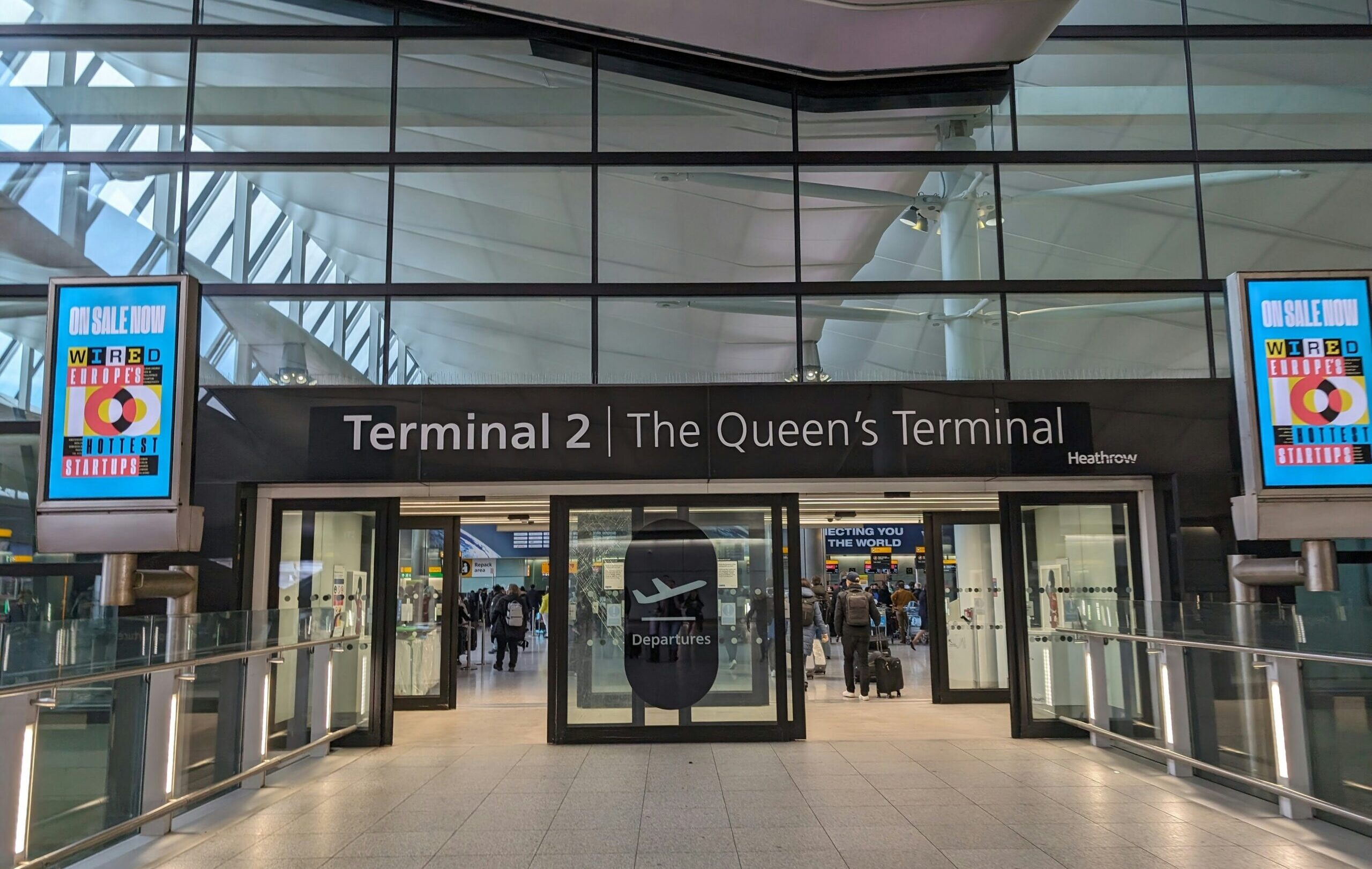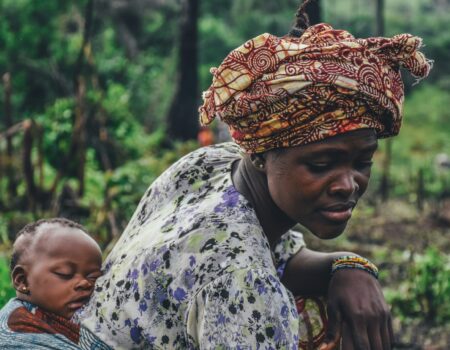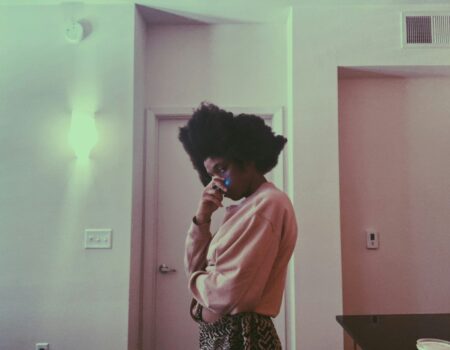Hot and whitewashed, I thought as I got off the plane, moving glibly through the sea of predominantly white faces. I didn’t know what to expect, but in my realm of no expectations, I did not expect the abroad to be like this. Sweat dripped down my sides and collected at the small of my back. I pulled off my coat and stuffed it into the hold-all containing the leopard-print trench coat my aunt had gifted me. I tugged at the turtleneck of my sweater and blew air into my body. This was not as hot as Nigeria, but it was hot enough.
Like a disjointed caterpillar, we trekked towards the shuttle waiting to take us to immigration. With each escalator descent and subsequent shuffle in the immigration line, the temperature climbed. The immigration line was a hodgepodge of white, Asian, middle eastern, and African faces. Some talked excitedly into their phones while others took duck-faced or cute deadpan pictures. Others stared vacantly ahead. It was apparent who was used to this and who wasn’t.
Kpekpeye, I am at Heathrow, I quickly tapped into my phone. This place is hot. This abroad is not abroad-ing at all.
My message was sent on a brief spurt of the epileptic network. The line moved like a wounded worm. I shifted my weight from one leg to another, adjusting and readjusting the bulk of my backpack. The straps dug painfully into my shoulder.
My phone chirped.
Hot? As in the place make sense or the weather dey hot? My younger brother asked. In response, I tapped into the phone: The weather na. The plane was colder.
‘Shuu, I dey tell you say I dey jand, you dey tell me say na lie. Abi you wan make I send pictures?’ retorted a young lady at the other line, her blond wig, and makeup as loud as her voice.
I smothered a smile. I could imagine the other person’s disbelief. I still couldn’t believe it myself. Earlier that day, I had been in Abuja. Now, I was here, in an unfamiliar environment, in a sea of foreign faces where I was the foreigner, for the first time. Going out without any form of identification was a habit for me back in Nigeria. Here, I was reduced to a set of IDs and numbers—and the thought of going out without at least one form of identification made my palms sweat.
My phone chirped again.
Pray make snow no turn harmattan sha. E be like say you don carry Nigerian weather come like this, replied my younger brother.
I allowed myself a smile. My family called me internal heat because I never felt cold, even when it was freezing. Everyone had been certain the temperamental English weather would humble me. But I seemed to have the upper hand.
The line trudged on. I stuffed my phone into my pocket, picked the hold-all and shuffled forward. The bands of conversation around me stretched and collapsed, with people informing loved ones of their arrivals and delineating preferred pickup points. And that was when it hit me: I had no one waiting for me on this side.
Fine, there was immigration, but still, no loved one.
The realization settled in my belly like a pinball. I told myself I had to be comfortable having no loved one at ‘Arrivals’ if I wanted to go places. The pinball turned to hunger pangs. I hadn’t eaten proper food in almost 48 hours.
Sha no be cold wey fit kill me here. Na hunger. My palate is too local. Couldn’t eat anything on the plane. E be like say una go dey freeze soup dey send come.
I hit send as the line broke off some heads away from me. A young man was taking a selfie. The people behind waited in long-suffering silence.
‘Correct!’ he muttered before stuffing the phone into his pocket and moving ahead, a skip in his step.
My scalp tingled from the heat. I shuffled ahead when the roll of movement got to me. The network disappeared, and the message remained unticked. A Nigerian lady with a freshly-minted but overcooked British accent asked which network I was using.
‘Airport Wi-Fi,’ I replied, amusement dripping off the words. The drops became a wave as she narrated her inability to connect to the WIFI, swapping -tions for -shanz and adding r’s after each vowel. A message chirped in just as she resolved the issue.
Gbafuo change palate, simpu. Plus you came with foodstuff. So you’re fine. Send me video make I see where you dey. Always so practical, this younger brother of mine.
I smiled and planted my face in my phone. Devil na bastard sha. Immediately I entered the plane, I started craving corn and pear. I enter escalator today sote I wan cry. I just saw stairs once. Every other thing na escalator. By force escalator.
There were only three people in front of me now. Chisom, the lady who booked my flight, said the immigration people did not like phones. Cradling my Nigerian-ness and the reality that we are perceived as rule-breakers close to my chest, I hit send and stuffed the phone determinately into my pocket. I was, once again, hit by this feeling of disembodiment, a certitude that I was not truly here, and if I breathed deeply enough, I would be back in Nigeria in my room with my cats. I kept my breaths shallow.
A winding road of events—dogeared by bank issues, IPOB sit-at-homes, missed appointments, and wrong passport dispatch—had led to this point. Thanks to a miscommunication between TLS Contact and me, my passport was sent to Enugu on the day I arrived in Abuja. As the lady at the visa office noted the tracking number, I felt that gentle whistle one hears before an explosion. My passport only got back yesterday afternoon after a flurry of desperate texts, harried phone calls, and hastily made plans. Content at finally holding its little green bulk, I stuffed it and the hastily torn packaging into the file. In the wake of all these, the curt ‘Congrats on leaving hell’ my neighbour on the plane had offered seemed appropriate. I held the same file securely under my armpit, its overstuffed bulk the totality of my reality here.
It is finally my turn. I sighed.
Despite the heat, my palms felt cold. I clenched and unclenched my fingers to stop them from trembling. My immigration officer was a stoic man with a bored expression. His tanned face held memories of what was once a classic handsomeness, the kind of bone structure you saw in black-and-white Hollywood movies. The spectre of a smile taxied through his lips as I approached.
‘Passport.’
I fished out the little green booklet and passed it underneath the glass.
‘If you could just take the mask down.’
I complied. He looked to and from the passport, nodded sharply.
‘All good.’
My whole being uncoiled only to coil right back when he said, ‘Letter, please.’
Chineke, Letter kwa? Which letter? My heart jangled my rib cage with its wild pounding. I rifled through my file, desperately thumbing through copies of my admission letter, passenger locator form, tenancy agreement, COVID test. I didn’t remember any letter except…
‘My admission letter?’ I offered, smiling nervously through my mask, hoping the smile reached my eyes.
‘No, Miss,’ came the calm reply, grey eyes boring into mine, scrutiny in their dark irises. ‘Your visa letter.’
‘Oh that,’ I replied in what I hoped was a knowing voice before resuming another frantic search of the file. I passed the hastily torn packaging a few times before stopping at it. A sheaf of white peaked through. I brought it out.
The letter!
I handed it to the man. He offered a conciliatory smile before double-checking on his computer. My tongue unclung from the roof of my mouth, and my shoulders dropped as the experience passed over me.
‘Do you speak English?’
I was, once more, thrust into a body bag of tension. Confusion and irritation spun like dust devils at the centre of my chest. My head suddenly felt too small for my body. Didn’t he see Nigerian on my passport? Wasn’t it on record that I was here on a student visa? How can I not speak the language I was meant to study in? I didn’t like what I felt I was about to experience. I hadn’t even been here for five hours. It was just too early. Many tart replies came to mind, but my mother’s home training hemmed them in.
I thought back to the last thing my older brother said on the phone the night before I left Enugu. There, you can choose to see hate, or you can choose to see ignorance. Pick whichever gives you peace of mind.
I let out a shaky breath as I brought down my mask. ‘Perfectly.’ There was grit in the soft reply.
‘Great. Mind reading this for me?’
He held up the letter and offered an encouraging smile. I couldn’t help smiling as I read: Show this to the immigration officer as soon as you arrive. Today, the ignorance was mine.
He offered the first real smile since our encounter. It was like watching dawn break. For the first time, I notice the slivers of silver at his temple.
‘Of course, I knew you could speak English.’
*
At the baggage carousel, I finally brought out my phone again. To my escalator rant, my younger brother replied: Village geh things dey occur. E choke.
I put my phone away as the first of my boxes spun into view. In a matter of minutes, the other two appeared. With much difficulty, I loaded them onto a trolley and, with the same difficulty, wheeled them towards Arrivals. I passed two men in uniform supervising a young man as he turned out his bags. My bags hadn’t been searched. I made to leave, but stopped. Always conscious of the ‘These Nigerians’ trope, I approached the men, the one I perceived as kinder looking—subsequent days here would show I felt more comfortable approaching the most ethnic-looking person.
‘Hi. Do I need to submit my bags for a check, too?’
‘What you got in there?’ he asked, his English, a lyrical texture particular to only Indians and northerners in my country.
‘Clothes, toiletries…’
‘You got food in there?’ an inky brow shooting up to make the statement a question. His straight hair was waxy under the unforgiving lighting.
‘Yes.’
‘No meat, no cheese, yea?’
‘Yes. None of that.’ Who travels with cheese bikonu?
‘You can go. No problem.’
As I left, I saw another young man, a Nigerian from the texture of his English, herded into a room for a thorough search.
*
The arrivals terminal was a fluster of goings, comings, hugs, and luggage. I tucked myself into a corner beside a giant potted plant, tired from pushing the overweight bags. I whipped out my phone. Chisom had booked the Uber. It was on its way. The air here was cooler. I could feel the sweat seeping back into my skin. I drenched deeper into the seat and took a video of my surroundings.
Seconds went by, and a reply chirped in.
But why here come dey like Nigeria? Abi na your phone camera? And this one your MTN is still working, you sure say no be Ghana or Cotonou you enter so?
I smiled at the message. I was holding too tightly to my phone, refusing to cut the cord to all things familiar, refusing to give in to the different emotions bubbling beneath the surface. I hated crowded places. Always have. Always will. The human treadmill of people entering and exiting the airport seemed to be closing in on me. Sitting beside the fronded plant, I opened and idly swiped through different apps, hoping the Uber would arrive soon. My ears carried the pressure from the flight like a brimming cup, and it stung. I held my breath for seconds, waiting for a pop that never happened.
*
It took twenty minutes for the driver to arrive and a further ten for me to negotiate my way to him. Settling into the toasty cocoon of the car, I breathed deeply for the first time in hours. The world around me didn’t dissipate. It was as unchanging as the skin on my nose. The four-car lanes stretched out before us like a wide, grey smile. The cold crept under my clothes like ivy as the compact car ate up the distance. My veins pushed through the pale skin of my palms in fibrous networks as the cold numbed my hands.
‘Can you turn off the air con—’ I began to say. The windows were open. The AC wasn’t even on. Abroad really was cold, after all.
MaryAnn Ifeanacho
MaryAnn Ifeanacho is a graduate of Creative Writing from the University of Hertfordshire. Her works have been published in the African Writer’s Magazine, JAY Lit, and the Kalahari Review. MaryAnn was shortlisted for the 2011 UBA Essay Competition, the 2017 African Rubiz Prize for Prose, the 2017 Poets in Nigeria (PIN) Food Poetry Competition, the 2023 Fab Prize for Children’s Fiction, and the 2024 WTAW Alcove Chapbook Competition. Her short story “Mykonos in Congealed Blood” was published as part of Flame Tree Publishing’s African Ghost Stories Anthology in April 2024.




